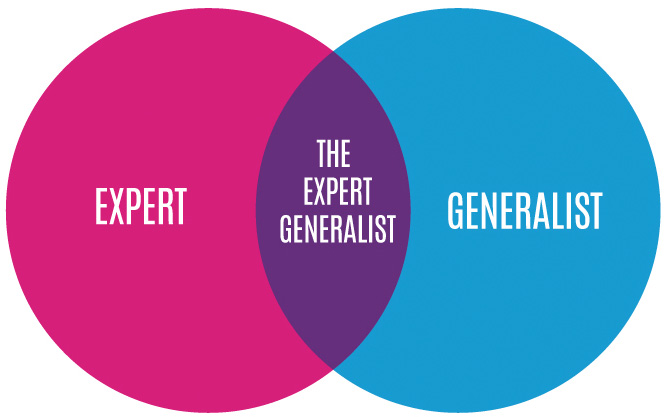Despite Business World Insistence on Specialization – Expert Generalists Will be at The Top
A big challenge for many businesses is recruiting top talent to fill specific needs and skill sets. As the technology industry and global economy continue to change by the day, recruitment of talent for many organizations is focused on very specialized skills. This is evident with technology software engineers (very deep skills in one area) but we have seen a shift to broader knowledge base.
Most singular specialists thrive best when everything is status quo. When business changes (example was during the 2008 recession), many specialists lost jobs and became extinct in their only skill set (think financial services industry). The question arises, who will be able to better sustain the changing dynamics within a corporate or entrepreneurial environment?

Carter Phipps, author of the book Evolutionaires (which offers many insights to understanding ourselves) states that generalists will thrive the world where it’s becoming more and more valuable to know “a little bit about a lot.” If you want to survive in the future workplace or as a business owner, having a cross over of knowledge in many areas may increase overall marketplace and customer value.
In many cases, being well read (deeply but broadly) will assist in moving the pendulum. In many cases being an expert generalist can lead to stronger relationships, which in turn can offer new business opportunities.
Recently, I had a conversation with a family office patriarch and we had an introductory meeting and the topic of Any Rand (author of many books – famous for Atlas Shrugged) came up during the meeting. We spent over an hour discussing the controversial book and it was clear that he wanted to see my viewpoints and critical thinking abilities. This simple example launched the relationship.
In the Harvard Business Review, Vikram Mansharamani published a post-titled “All Hail The Generalist”.
“Approximately 2,700 years ago, the Greek poet Archilochus wrote, “The fox knows many things, but the hedgehog knows one big thing.” Isaiah Berlin’s 1953 essay “The Fox and the Hedgehog” contrasts hedgehogs that “relate everything to a single, central vision” with foxes who “pursue many ends connected…if at all, only in some de facto way.” It’s really a story of specialists vs. generalists.”
“For various reasons, though, the specialist era is waning. The future may belong to the generalist. Why’s that? To begin, our highly interconnected and global economy means that seemingly unrelated developments can affect each other.”
One of the best examples of an expert generalist is Charlie Munger. He is the business partner of widely know Warren Buffet. Most have never heard of him (outside the investment world). His success has been driven from studying differently than many from the investment business.
“Warren Buffett has said of Munger, “He is truly the broadest thinker I have ever encountered. From business principles to economic principles to the design of student dormitories to the design of a catamaran he has no equal… Our longest correspondence was a detailed discussion on the mating habits of naked mole rats and what the human species might learn from them.” Munger has, in short, been the ultimate expert-generalist.” Business Insider.
Ask yourself, what has provided the most opportunities in your business or career – expertise in one silo or an expert generalist? A great starting point to think more like and expert-generalist is re-building your network. Have a new focus toward developing an “open” group of many people with completely different interests and expertise. It might not guarantee success, but it will increase the number of opportunities leading to success.
